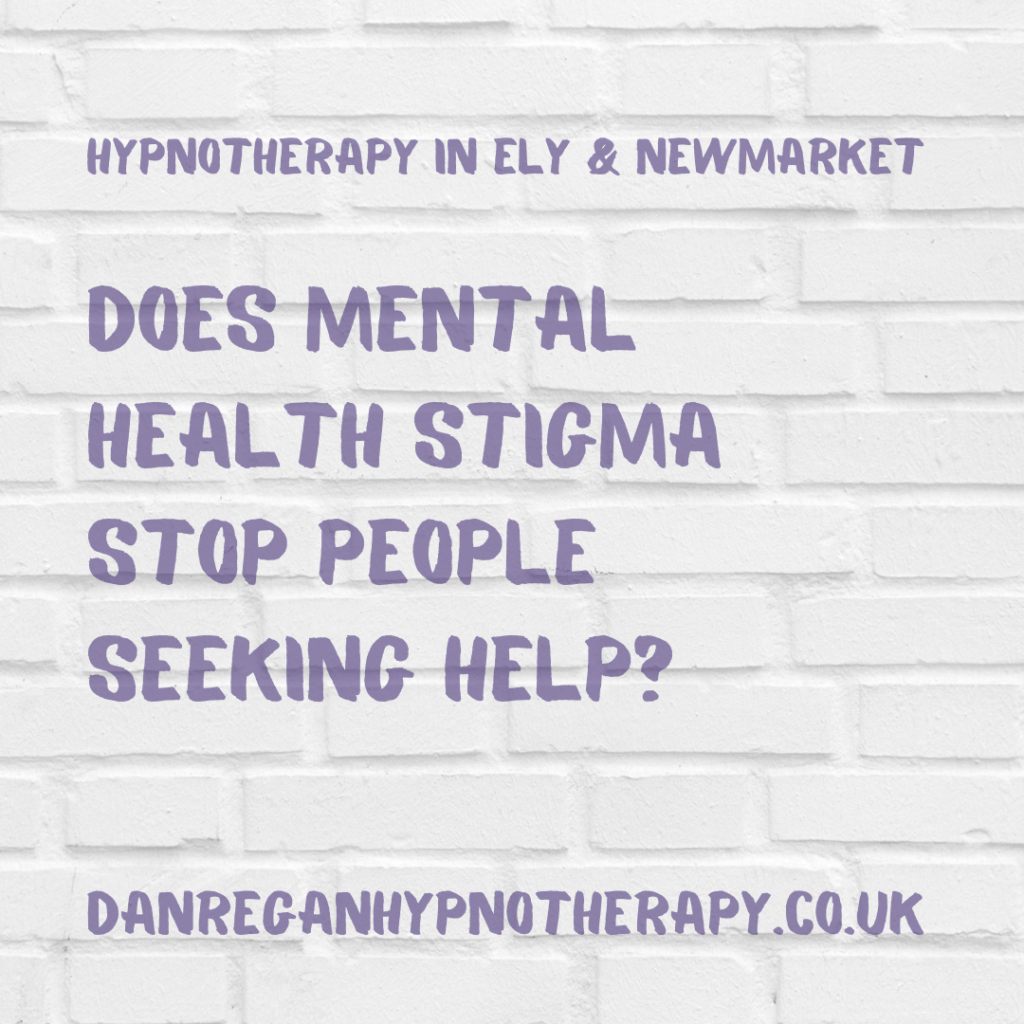
Does Mental Health Stigma Stop People Seeking Help?
A little while back marked the annual ‘Time To Talk Day’ which is part of the ‘Time To Change’ campaign to end mental health discrimination. The campaign encourages people to talk about mental health as a way of breaking down the barriers and stigma around the subject.
And, of course, showing support to others and creating a space where you can talk about and express feelings is a good thing. In my experience, many people still do not understand things like anxiety and depression unless or until they experience it for themselves. Being open, supportive and showing others that they matter is always important. If someone close to you wants to talk then be there for them; if someone close to you doesn’t want to talk then be there for them.
There’s little doubt that there is still much room for improvement in improving education, support and help for people struggling with mental health problems. Talking about mental health is good yet much more needs to be done for people to understand and feel able to actively seek the help they need (which is perhaps where many well-meaning ‘just talking about it’ groups come unstuck).
We could probably also have a long conversation about whether talking about ‘stigma’ inadvertently supports its existence. Some might argue that talking about it and highlighting it just re-enforces it because it keeps it in existence (if you follow me…if you keep telling people there is stigma and re-enforcing the idea in people’s minds then it will always exist won’t it?). Far better, in my opinion, to talk about what we do want – good mental health and appropriate support and recognition – and be the change we want to see.
Anyway, I could digress but here today I’m more interested in looking at whether mental health related stigma does in fact deter or stop people from seeking help.
Mental Health Stigma and Seeking Help
One of the trickiest things to measure and understand is the level of any mental health stigma and whether campaigns to reduce it are effective at changing understanding and perceptions around mental health. With this complex issue in mind, a team of researchers looked to analyse social media to assess stigma levels.
The study (reference at foot of article) used Twitter to investigate stigmatising and trivialising attitudes across a range of mental and physical health conditions. They looked at tweets associated with five mental health and five physical health conditions and, from over a million collected tweets, they looked at a sample of these per condition.
As they report in their results, “Overall, mental health conditions were found to be more stigmatised (12.9%) and trivialised (14.3%) compared to physical conditions (8.1% and 6.8% respectively).”
Overall, the findings from this piece of research suggest that mental health stigma is common on social media and that while people may be more open to discussing mental health problems there is a need to make sure this is done appropriately. Certainly good education and sharing of knowledge about mental health can help here as with certain physical conditions too).
Of course, as the researchers point out, there is (perhaps particularly with Twitter where posts are limited to a certain number of characters) some loss of context in any analysis such as this and it can be a bit tricky to assess the tone of some tweets (heck, people often misjudge the tone of e-mails where you can pretty much write as much or as little as you choose to convey your message).
The report concludes with this, “We have shown that stigma and trivialisation are highly prevalent on social media and that, as an ever-greater proportion of social interaction takes place online, proactive campaigns should consider assessing and addressing both on social media platforms.”
They go on to suggest that in the future, computer algorithms could be developed which are capable to detect stigma on social media and give the opportunity to target anti-stigma campaigns to those who may benefit from it the most. That perhaps is another drawback of some current mental health campaigns; in many cases they may be talking to the converted and knowledgeable and so not necessarily reducing stigma in as much of a meaningful way as they would wish.
That said, there will most likely remain those pockets of people who ‘close their minds’ to mental health knowledge and education, in the same way as can happen with some physical conditions.
So this research highlights the levels of stigma and trivialisation attitudes towards certain mental health conditions, but does that mental health related stigma impact on people seeking help for mental health problems?
Mental Health Related Stigma & Help-Seeking
To address this question we can look at a systematic review that investigated this very thing; ‘What is the impact of mental-health related stigma on help-seeking? A systematic review of quantitative and qualitative studies’ (full reference at foot of article).
The authors of the study pointed out that individuals often avoid or delay seeking professional help for mental health problems, and this can adversely impact on issues such as depression and anxiety disorders.
The review identified and looked at 144 studies with over ninety thousand participants. Stigma was the fourth highest barrier to help-seeking with disclosure concerns the most commonly reports stigma barrier.
They defined ‘stigma’ as being ‘a process involving labelling, separation, stereotype awareness, stereotype endorsement, prejudice and discrimination in a context in which social, economic or political power is exercised to the detriment of members of a social group.’
In the paper they mention several different types of stigma that can exist. These include, amongst others, anticipated stigma (anticipation of personally being perceived or treated unfairly), experienced stigma (personal experience of being perceived or treated unfairly), perceived stigma (your view about the extent to which people in general have stigmatizing attitudes/behaviour towards people with mental illness) and treatment stigma (the stigma associated with seeking/receiving treatment for mental ill health).
Overall they concluded that “stigma has a small to moderate sized negative effect on help seeking” for mental health problmes. Ethnic minorities, youth, men and those in military and health professions were disproportionately deterred by stigma. Stigma was found to be a moderately important barrier and ranked fourth out of ten barriers in this study, with disclosure and confidentiality concerns being the most prominent type of barrier. Another barrier to seeking help for mental health issues can be that people want to try and handle the problem on their own or may not perceive the need for help.
The report also goes on to talk about the implications for mental help related help-seeking. They write,
“Stigma has a clear, but small to moderate, deterrent effect on help-seeking for mental health problems…the data we reviewed demonstrate that multiple different types and aspects of stigma contribute to this effect…examination of the major associations, barriers and themes indicates that anti-stigma programmes, services and practitioners should focus on countering stereotypes (particularly weakness and ‘craziness’), social judgment and rejection of people with mental health problems, employment discrimination; and shame/embarrassment.”
As long as there is stigma associated to mental health and mental health help-seeking then there is still work to be done to tackle it (although as we all know from many areas of human life, eradicating all stigma and discrimination is an ongoing event). How powerful and beneficial would it be to see mental health promoted to the same level of aspects such as sexism, racism, homophobia, where stigma and discrimination are widely discussed, understood and not tolerated?
Education is part of this; talking about mental health is another aspect and the more we can do to ‘live the change’ the less stigma there will be and the easier more people will find it to address their mental health problems and seek effective treatment. Let’s ditch the whole ‘stigma’ language and start just talking about mental health in its correct context and position; as something we all have, in the same way we have a level of physical health. Sometimes our physical and mental health can be better than other times and we often need to do things to improve and maintain it. I think we’ve moved beyond time to just talk, and now we need to move on and make time to ‘do’.
To your success,
Dan Regan
Hypnotherapy in Ely and Newmarket
Seeking help to overcome your anxiety or another aspect of mental health? Book your Complimentary Hypnotherapy Strategy Session with Dan now: Appointments
Find out what other people have said after their hypnotherapy sessions with Dan: What People Say
And check out these powerful hypnosis downloads that can start helping you right away: Hypnosis Downloads
References:
1) Robinson, P., Turk, D., Jilka, S. et al. Measuring attitudes towards mental health using social media: investigating stigma and trivialisation. Soc Psychiatry Psychiatr Epidemiol (2019) 54: 51. https://doi.org/10.1007/s00127-018-1571-5
2) Clement, S., Schauman, O., Graham, T., Maggioni, F., Evans-Lacko, S., Bezborodovs, N., . . . Thornicroft, G. (2015). What is the impact of mental health-related stigma on help-seeking? A systematic review of quantitative and qualitative studies. Psychological Medicine, 45(1), 11-27. doi:10.1017/S0033291714000129




0 Comments